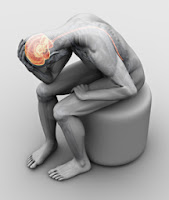An antidepressant is a psychiatric medication used to alleviate mood disorders, such as major depression, schizophrenia, dysthymia and anxiety disorders such as social anxiety disorder.
- Most typical antidepressants have a delayed onset of action (2–6 weeks) and are usually administered for anywhere from months to years. Despite the name, antidepressants are often used to treat other conditions, such as anxiety disorders, obsessive compulsive disorder, eating disorders, chronic pain, and some hormone-mediated disorders such as dysmenorrhea. Some of these uses are FDA-approved and some are off-label.
- Alone or together with anticonvulsants (e.g., carbamazepine or valproate), these medications can be used to treat attention-deficit hyperactivity disorder (ADHD) and substance abuse by addressing underlying depression. Also, antidepressants have been used sometimes to treat snoring and migraines.
Selective Serotonin Reuptake Inhibitors:
The Selective serotonin reuptake inhibitors (SSRIs) are the class of antidepressants commonly used as the first line treatment for depression because they have a favorable side-effect profile and low toxicity. This class of drugs includes:
- Citalopram (Celexa, Cipramil) Antidepressant
- Escitalopram (Lexapro, Cipralex, Seroplex, Lexamil) Antidepressant
- Fluoxetine (Prozac, Sarafem, Symbyax) Antidepressant
- Fluvoxamine (Luvox) Antidepressant
- Paroxetine (Paxil, Aropax) Antidepressant
- Sertraline (Zoloft) Antidepressant
- Vilazodone (Viibryd) Antidepressant
Serotonin-Norepinephrine Reuptake Inhibitors:
These include:
- Desvenlafaxine (Pristiq) Antidepressant
- Duloxetine (Cymbalta) Antidepressant
- Milnacipran (Ixel) Antidepressant
- Venlafaxine (Effexor) Antidepressant
There are some general side effects with the use of SNRIs which includes:
- Nausea
- Dry Mouth
- Dizziness
- Insomnia (numbness)
- Sleepiness
- Constipation
- Increased Blood Pressure
- Excessive Sweating
- Tremor
- Headache
- Agitation
- Muscle Weakness
Noradrenergic and specific serotonergic antidepressants :
Noradrenergic and specific serotonergic antidepressants (NaSSAs) form a newer class of antidepressants which purportedly work to increase norepinephrine (noradrenaline) and serotonin neurotransmission by blocking presynaptic alpha-2 adrenergic receptors while at the same time blocking certain serotonin receptors.
Side-effects may include drowsiness, increased appetite, and weight gain.
Examples include:
- Mianserin (Tolvon)
- Mirtazapine .
Tricyclic Antidepressants:
the tricyclic include:Tertiary amine tricyclic antidepressants:
- Amitriptyline (Elavil, Endep) Antidepressant
- Clomipramine (Anafranil) Antidepressant
- Doxepin (Adapin, Sinequan) Antidepressant
- Imipramine (Tofranil) Antidepressant
- Trimipramine (Surmontil) Antidepressant
Secondary amine tricyclic antidepressants
- Desipramine (Norpramin) Antidepressant
- Nortriptyline (Pamelor, Aventyl, Noritren) Antidepressant
- Protriptyline (Vivactil) Antidepressant
Monoamine oxidase inhibitor:
Irreversible monoamine oxidase inhibitors (MAOIs) may be used if other antidepressant medications are ineffective. MAOIs work by blocking the enzyme monoamine oxidase, which breaks down the neurotransmitters dopamine, serotonin, and norepinephrine (noradrenaline).
- Isocarboxazid (Marplan) Antidepressant
- Moclobemide (Aurorix, Manerix) Antidepressant
- Phenelzine (Nardil) Antidepressant
- Selegiline (Eldepryl, Emsam) Antidepressant
- Tranylcypromine (Parnate) Antidepressant
Antidepressant Withdrawal Symptoms :
If an SSRI medication is suddenly discontinued, it may produce both somatic and psychological withdrawal symptoms, a phenomenon known as "SSRI discontinuation syndrome" (Tamam&Ozpoyraz, 2002). When the decision is made to stop taking antidepressants it is common practice to "wean" off of them by slowly decreasing the dose over a period of several weeks or months depending on a person's response to reductions. Most cases of discontinuation syndrome last between one and four weeks.
